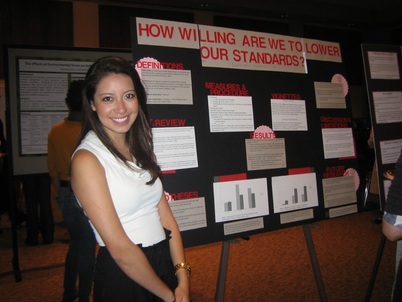|
5/23/2012 0 Comments Loyola Scientista Spotlight!Meet Laura Loyola, a soon-to-be graduate of Loyola University Maryland and published psychology researcher  Loyola at the Undergraduate Student Research and Scholarship Colloquium. We at Loyola University Maryland are delighted to have introduced Scientista to our campus in April. Already, there is a great display of interest and involvement among students. We are eager to further promote Scientista at Loyola, so we would like to begin by highlighting one of our very own women scientists. Laura Loyola, a senior undergraduate student, recently had her research on romantic relationships published in the spring edition of the Modern Psychological Sciences journal. I had the opportunity to ask her a few questions about this amazing accomplishment. Q: Let’s start with the basics: how did you get started with your research? A: I took a close relationships class with Dr. DiDonato. When I signed up, I just thought it sounded interesting; I had no idea what I was getting into! The class was two semesters long and research driven, so my project began with the research I did in this course. Q: Which aspects of close relationships did you focus on in your study? A: I looked at romantic relationships and how people’s histories affected them. Specifically, I was interested in the initial stages of relationships when couples ask about each other’s backgrounds: what happened during their previous relationships, why they ended, why they want to start a new one. I wanted to explore how faithfulness history (like if one partner had cheated in the past) determined the future success of a relationship. Another variable I looked at was mate value, or the overall attractiveness of a person as a potential mate (their financial prospects, social status, etc.). Q: What was the process of publishing like? A: Dr. D. emailed me and encouraged me to submit my work to MPS, an undergraduate psychology journal. I only had two weeks to edit everything and go through the journal’s guidelines and criteria. It was a very hectic two weeks! I accidentally sent out the wrong copy originally, the unedited version. I emailed Dr. D. in a panic asking what to do, and she assured me I just needed to send them an email and explain the situation. Luckily, it worked out in the end and they got the right version! Q: How does it feel to have your own study printed in an academic journal? A: It’s really exciting. Out of all the people in my class, I never thought I’d be the one with published results. I never thought it would be me. I’m still trying to wrap my mind around it! My parents were freaking out. I couldn’t have done this without Dr. D. or my research assistants, Brian Lojewski and Kayleigh McGrattan. I was in shock initially, and now I’m realizing this is the biggest thing in my college career. Q: Has your experience with research impacted your post-grad plans? A: It has changed my perspective on what I want to do with psych. Initially, I wanted to do counseling; I never saw myself as a researcher. I’m going to take a year off to decide, because now I’m at a crossroads between research and counseling. I’m not sure what age group I want to work with, but I have a lot of experience with kids. With all my work on close relationships, I’m also interested in couples counseling. I would like to do research, even if I just do it on the side—if that’s even possible. I think I could combine my work with kids and relationships and maybe research how the basis for future relationships starts in childhood, like attachment theory research. Q: Any advice for other aspiring women in science? A: Definitely have a really good mentor to help and guide you through it all. Like I said, Dr. D. played a huge role in my success. Stay committed to the project. Time management is also really important; I had six classes going on while I was working on the study. It helps to always keep the end goal in your mind, knowing that your work could get published. We hope that showcasing Laura’s impressive hard work will inspire our other women scientists on campus. We are proud to have her! For those interested in reading Laura’s research, the citation is as follows: Loyola, L. & DiDonato, T.E. (2012). How willing are we to lower our standards? Mate preferences as a function of mate value and faithfulness history. Modern Psychological Studies, 17, 105-113. Written by: Jessica Harras
0 Comments
Your comment will be posted after it is approved.
Leave a Reply. |
Welcome, LUM Scientistas!The Loyola Scientista chapter is dedicated to providing every Loyola scientista with campus-related advice, news, articles, features and more. Browse through our website and join our mailing list to gain access to great resources and events!
CategoriesAll Meet The Team Opportunities Scientista Spotlight LUM Scientista PicsWhat's NewUpcoming EventsNew National ArticlesSubscribe To Our Mailing ListArchives
March 2015
|
The Scientista Foundation, Inc. All Rights Reserved © 2011-2021 | Based in NY | [email protected]
The Network for Pre-Professional Women in Science and Engineering
The Scientista Foundation is a registered 501(c)(3) -- Donate!
The Network for Pre-Professional Women in Science and Engineering
The Scientista Foundation is a registered 501(c)(3) -- Donate!


 RSS Feed
RSS Feed